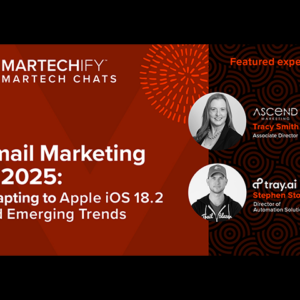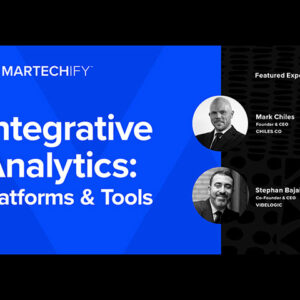7 Innovative Strategies Driving Success in the Digital Age
- Martechify
- AI and Automation, Digital Transformation, Strategy and Trends
In today’s fast-paced digital landscape, businesses are constantly seeking new ways to stay ahead of the curve and connect with their target audiences more effectively. Enter artificial intelligence (AI), a game-changing technology that is revolutionizing the way companies approach marketing. From personalized messaging to automated content creation, AI is empowering marketers to streamline processes, enhance customer experiences, and drive better results.
The rise of AI in marketing
AI has rapidly evolved from a futuristic concept to a practical reality, and its applications in marketing are vast and far-reaching. By harnessing the power of machine learning algorithms and data analysis, AI can uncover valuable insights, identify patterns, and make predictions that would be nearly impossible for humans to achieve manually. This newfound capability is enabling marketers to craft highly targeted campaigns, optimize their strategies in real-time, and deliver truly personalized experiences to their customers.
Innovative AI marketing strategies in action
As businesses continue to embrace the potential of AI, we’re witnessing a surge of innovative marketing strategies that leverage this cutting-edge technology. Let’s explore some real-world examples of how companies are using AI to elevate their marketing efforts:
1. Seattle Ballooning: Chatbot booking assistant
For those seeking a unique and unforgettable experience, Seattle Ballooning offers the opportunity to float among the clouds in the Pacific Northwest. To streamline the booking process, the company has implemented a chatbot on its website, allowing customers to easily schedule their dream trip with the help of an AI-powered virtual assistant. Chatbots are becoming increasingly popular in the marketing realm, as they provide a seamless and efficient way to engage with customers, answer their queries, and guide them through the purchasing journey. By leveraging natural language processing and machine learning, these AI-powered assistants can understand and respond to customer inquiries in real-time, enhancing the overall user experience.
2. Nike: AI-powered video creation
In the world of marketing, visual content is king, and Nike has embraced AI to take its video production to new heights. The sportswear giant has leveraged AI technology to create personalized video ads tailored to individual users’ behaviors and preferences. By analyzing data on customer interactions, purchase histories, and browsing patterns, Nike’s AI system can generate unique video content that resonates with each viewer. This level of personalization not only captures attention but also fosters a deeper connection between the brand and its customers, ultimately driving engagement and sales.
3. Consistent brand messaging with AI
For businesses with multiple marketing teams, agencies, or freelancers contributing to their campaigns, maintaining a consistent brand voice and messaging can be a daunting task. However, AI platforms offer a solution by allowing companies to incorporate their own style guides and marketing rules into the AI system. By leveraging AI, businesses can ensure that all marketing materials, from advertisements to social media posts, adhere to their brand guidelines, regardless of who creates them. This not only streamlines the content creation process but also reinforces brand identity and cohesion across all touchpoints.
4. Goosehead Insurance: Website content creation
Refreshing a website can be a time-consuming and resource-intensive endeavor, especially for small teams operating at full capacity. Goosehead Insurance recognized this challenge and turned to AI to accelerate the process of creating a variety of content for their website. Using an AI platform like Jasper, the insurance company was able to generate FAQ documents, market analyses, benefits statements, and other assets efficiently. This not only saved valuable time but also ensured that the website content was tailored to the company’s new target audience, enhancing the overall user experience.
5. Subject line optimization
In the realm of email marketing, subject lines play a crucial role in determining whether recipients will open and engage with the message. However, crafting compelling and effective subject lines can be a time-consuming process, often involving extensive testing and iteration.AI offers a solution to this challenge by enabling marketers to quickly trial and optimize subject lines. By leveraging machine learning algorithms and data analysis, AI systems can suggest subject line variations that are more likely to resonate with the target audience, increasing open rates and overall email campaign performance.
6. Personalized email campaigns
Email marketing remains a powerful tool for businesses to connect with their customers, but creating personalized campaigns that truly resonate can be a daunting task. AI-powered marketing automation platforms have emerged to address this challenge, allowing businesses to analyze customer data, behavior, preferences, and demographics to create highly targeted and personalized email campaigns.By leveraging AI, companies can segment their email lists based on specific criteria, craft tailored messaging, and even optimize content and subject lines to maximize engagement and conversions. This level of personalization not only enhances the customer experience but also drives better results for the business.
7. AI-Driven social media marketing
Social media has become an indispensable part of modern marketing strategies, but managing multiple platforms, tracking trends, and analyzing consumer feedback can be overwhelming. AI offers a solution by enabling businesses to leverage machine learning algorithms to monitor social media conversations, identify emerging trends, and gain valuable insights into consumer behavior and preferences.With AI-powered social media marketing tools, companies can create more relevant and engaging content that resonates with their target audiences. Additionally, AI can assist in optimizing social media advertising campaigns, targeting specific demographics, and even automating certain aspects of social media management, freeing up valuable time and resources for marketers.
Embracing the future of AI in marketing
As these examples illustrate, AI is rapidly transforming the marketing landscape, offering businesses a wealth of opportunities to enhance their strategies, streamline processes, and deliver exceptional customer experiences. However, it’s important to note that AI is not a one-size-fits-all solution; its implementation requires careful planning, data-driven decision-making, and a willingness to embrace change. Businesses that embrace AI in marketing will not only gain a competitive edge but also position themselves at the forefront of innovation. By leveraging the power of AI, marketers can unlock new levels of efficiency, personalization, and data-driven insights, ultimately driving better results and fostering stronger connections with their customers. As AI continues to evolve and become more sophisticated, its applications in marketing will undoubtedly expand, opening up new possibilities for businesses to engage with their audiences in innovative and meaningful ways. The future of marketing is inextricably linked to the advancement of AI, and those who embrace this technology today will be well-positioned to thrive in the ever-changing digital landscape of tomorrow.
Sources
- 7 Real-World AI Marketing Examples (+Tips) – LocaliQ
- 10 Tech Trends for Marketing Teams to Watch – Business News Daily
- How to Design an AI Marketing Strategy – Harvard Business Review
- 26 Outstanding Examples of AI in Marketing – Invoca













